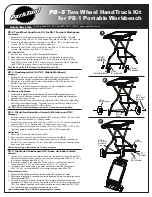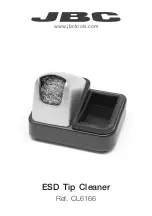
F181-50
EN
Copyright © 2015
P a g e
|
6
www.Ford-tools.com
instructions to operate it.
Power tools are potentially dangerous in the
hands of untrained users.
Maintenance. Check for misalignment or jammed moving parts,
breakages or any other feature that might affect the operation of the
power tool.
If it is damaged, the power tool must be repaired. Many
accidents are caused by using poorly maintained power tools.
Keep cutting tools sharp and clean.
Properly maintained cutting tools with
sharp cutting edges are less likely to jam and are easier to control.
Use the power tool, accessories and cutting tools, etc., in accordance
with these instructions and in the manner intended for the particular
type of power tool, taking into account the working conditions and the
work which needs to be done.
Using a power tool in ways for which it was
not intended can lead to potentially hazardous situations.
5.5
Service
Your power tool should be serviced by a qualified specialist using only
standard spare parts.
This will ensure that it meets the required safety
standards.
6
ADDITIONAL SAFETY INSTRUCTIONS FOR BATTERIES
AND CHARGERS
6.1
Batteries
Never attempt to open for any reason.
Do not store in locations where the temperature may exceed 40 °C.
Charge only at ambient temperatures between 4 °C and 40 °C.
Charge only using the charger provided with the tool.
When disposing of batteries, follow the instructions given in the section
“Protecting the environment”.
Do not cause short circuits. If connection is made between the positive (+)
and negative (-) terminal directly or via accidental contact with metallic
objects, the battery is short circuited and an intense current will flow causing
heat generation which may lead to casing rupture or fire.
Do not heat. If batteries are heated to above 100 °C, sealing and insulating
separators and other polymer components may be damaged resulting in
electrolyte leakage and/or internal short circuiting leading to heat generation
causing rupture or file. Moreover do not dispose of the batteries in fire,
explosion and/or intense burning may result.
Under extreme conditions, battery leakage may occur. When you notice liquid
on the battery, proceed as follows:
Carefully wipe the liquid off using a cloth. Avoid skin contact.
In case of skin or eye contact, follow the instructions below:
9
Immediately rinse with water. Neutralize with a mild acid such as lemon
juice or vinegar.
9
In case of eye contact, rinse abundantly with clean water for at least 10
minutes. Consult a physician.
Fire hazard! Avoid short-circuiting the contacts of a detached
battery. Do not incinerate the battery.
































